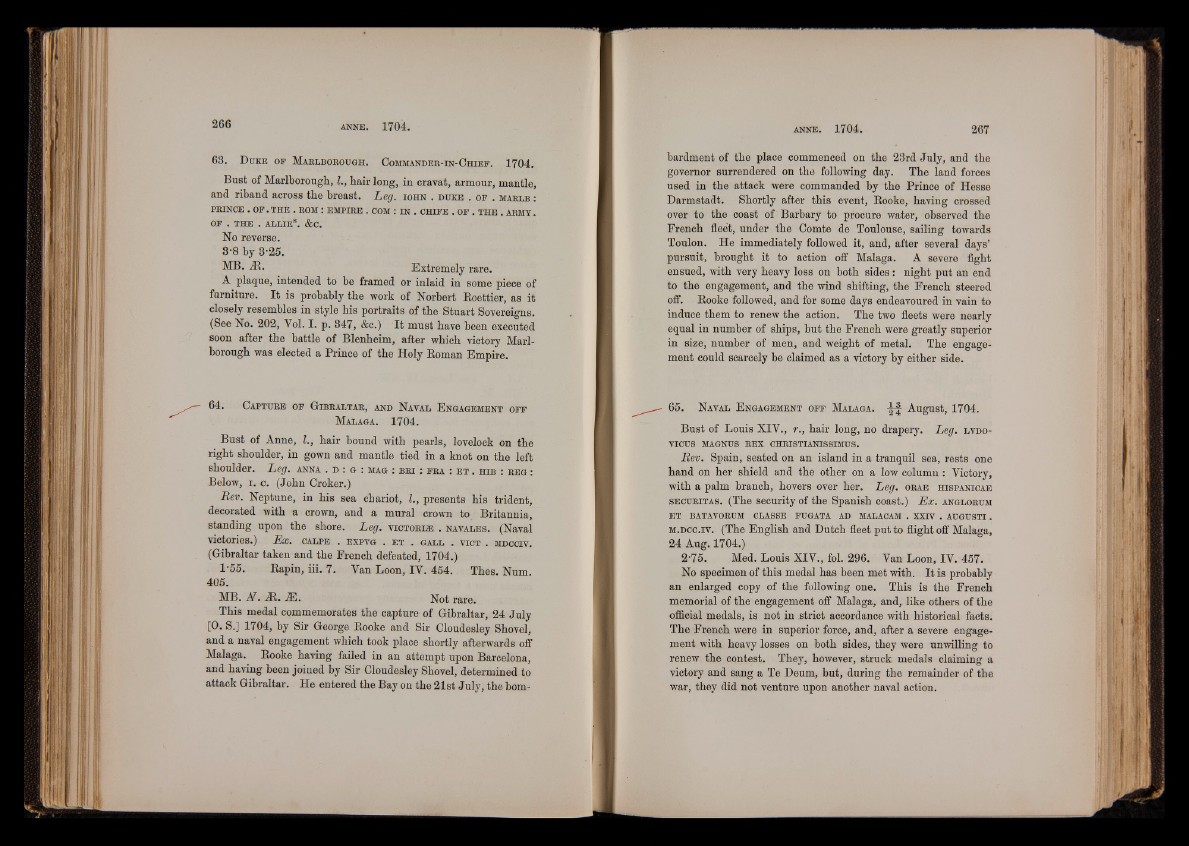
63. D u k e o f M a b l b o b o u g h . C omm andeb - in -C h i e f . 1704.
Bust of Marlborough, I., hair long, in cravat, armour, mantle,
and riband across the breast. Leg. io h n . d u k e . o f . maklb :
PRINCE . OF. THE . BOM : EMPIRE . COM : IN . CHIFB . OF . THE . ARMY.
OF . THE . ALLIE8. &C.
No reverse.
8-8 by 3-25.
MB- Extremely rare.
A plaque, intended to be framed or inlaid in some piece of
furniture. It is probably the work of Norbert Roettier, as it
closely resembles in style his portraits of the Stuart Sovereigns.
(See No. 202, Vol. I. p. 847, &c.) It must have been executed
soon after the battle of Blenheim, after which victory Marlborough
was elected a Prince of the Holy Roman Empire.
64. C a p t u r e o f G ib r a l t a r , and N aval E n g a g em en t o f f
M a laga. 1704.
Bust of Anne, L, hair bound with pearls, lovelock on the
right shoulder, in gown and mantle tied in a knot on the left
shoulder. Leg. anna . d : g : mag : b r i : f r a : e t . h ib : b e g :
Below, i. c. (John Croker.)
Rev. Neptune, in his sea chariot, I , presents his trident,
decorated with a crown, and a mural crown to Britannia,
standing upon the shore. Leg. v ic to r l® . n a v a l e s . (Naval
victories.) Ex. c a l p e . e x p v g . e t . g a l l . v ic t . m doc iv.
(Gibraltar taken and the French defeated, 1704.)
1-55. Rapin, iii. 7. Van Loon, IY. 454. Thes. Num
405.
MB. N . At. AS. Not rare.
This medal commemorates the capture of Gibraltar, 24 July
[O. S.] 1704, by Sir George Rooke and Sir Cloudesley Shovel,
and a naval engagement which took place shortly afterwards oif
Malaga. Rooke having failed in an attempt upon Barcelona,
and having been joined by Sir Cloudesley Shovel, determined to
attack Gibraltar. He entered the Bay on the 21st July, the bombardment
of the place commenced on the 23rd July, and the
governor surrendered on the following day. The land forces
used in the attack were commanded by the Prince of Hesse
Darmstadt. Shortly after this event, Rooke, having crossed
over to the coast of Barbary to procure water, observed the
French fleet, under the Comte de Toulouse, sailing towards
Toulon. He immediately followed it, and, after several days’
pursuit, brought it to action off Malaga. A severe fight
ensued, with very heavy loss on both sides : night put an end
to the engagement, and the wind shifting, the French steered
off. Rooke followed, and for some days endeavoured in vain to
induce them to renew the action. The two fleets were nearly
equal in number of ships, but the French were greatly superior
in size, number of men, and weight of metal. The engagement
could scarcely be claimed as a victory by either side.
65. N aval E n g a g em e n t o f f M a laga, August, 1704.
Bust of Louis XIV., r., hair long, no drapery. Leg. lv d o -
VIOUS MAGNUS REX CHRISTIANISSIMUS.
Rev. Spain, seated on an island in a tranquil sea, rests one
hand on her shield and the other on a low column : Victory,
with a palm branch, hovers over her. Leg. orae h is p a n ic a e
Se c u r it a s . (The security of the Spanish coast.) Ex. anglorum
ET BATAVORUM CLASSE FUGATA AD MALACAM . XXTV . AUGUSTI.
m .d c c .iv . (The English and Dutch fleet put to flight off Malaga,
24 Aug. 1704.)
2-75. Med. Louis XIV., fol. 296. Van Loon, IV. 457.
No specimen of this medal has been met with. It is probably
an enlarged copy of the following one. This is the French
memorial of the engagement off Malaga, and, like others of the
official medals, is not in strict accordance with historical facts.
The French were in superior force, and, after a severe engagement
with heavy losses on both sides, they were unwilling to
renew the contest. They, however, struck medals claiming a
victory and sang a Te Deum, but, during the remainder of the
war, they did not venture upon another naval action.